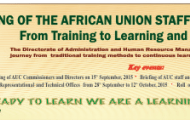Topic Resources
African Common Position on the AU Campaign to End Child Marriage in Africa
Day of the African Child - Communication and Advocacy Guide
Agenda 2063 is Africa’s development blueprint to achieve inclusive and sustainable socio-economic development over a 50-year period.
39th AU summit Media Accreditation Platform











